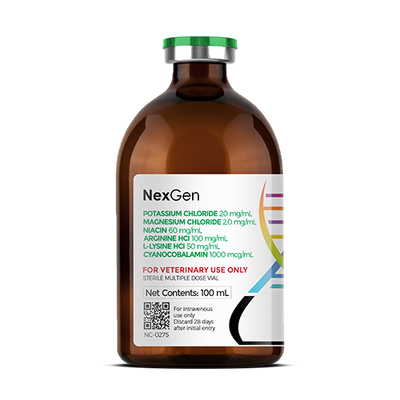
B-Quiet (Tryptophan + Magnesium Chloride + Thiamine + Calcium Levulinate), Injectable, (100mL)
Login for pricing
- Brand
- Mixlab
- SKU:
- NC-0184
- Product Type:
- Injectable
- Size:
- 100ml
- Administration:
- Intravenous
Excitability in horses references a type or types of unpredictable, undesirable agitation displayed by a horse.1 Typically, it does not refer to the energy level or stamina of the horse itself. This is an important difference to note, because every horse has its own temperament, and some horses and certain breeds are naturally more energetic than others. This doesn’t necessarily mean that they are excitable. For example, a Thoroughbred and a Quarter Horse have different energy levels and temperament, but both can be excitable at times.2
While there are many potential causes for excitability in the horse, diet and nutrition have been shown to play an important role in the equine temperament. Research has determined that supplementing certain vitamins and minerals to the horse’s diet can reduce anxiety and excitability by assisting in the maintenance of proper nerve function.3
Tryptophan
Tryptophan is an essential amino acid that is required to form the neurotransmitter serotonin, which is important for normal brain function and particularly is associated with reduced fearfulness and aggression.4,5 Serotonin is related to sedation and lower levels of fear, stress, and aggression in humans and some animal species.
Unlike drugs, tryptophan is not directly active as a calming agent, but is utilized by the horse’s body to manufacture the chemical compounds that aid in calming. Once tryptophan is absorbed and in the bloodstream, it crosses into the brain and is synthesized into serotonin.5 Serotonin is responsible for signal transmission between nerve cells and acts as a chemical messenger to keep brain impulses flowing efficiently.
Magnesium Chloride
Magnesium (Mg) is an essential mineral that horses require for proper nerve and muscle function. Magnesium functions as an electrolyte, plays a role in protein synthesis and is involved in hundreds of metabolic processes. It is especially important for growing and performance horses.
Magnesium is absorbed in the horse’s small intestine, with the second half of the small intestine being slightly more effective at absorbing magnesium. It is believed that very little magnesium is absorbed from the horse’s hindgut.5
Thiamine
Thiamine (also called vitamin B1) is a water-soluble vitamin and one of the group of B complex vitamins. Thiamine is necessary for the conversion of carbohydrates to energy, and it is necessary for the processing of Pyruvic acid, the waste product from muscle exertion which converts into lactic acid, a cause of muscle fatigue and stiffness. Studies have shown that performance horses may need as much as twice the thiamine than non-working horses. Thiamine is also essential for the transmission of nerve impulses; research has shown that thiamine-deficient horses may act in a distracted, nervous manner.4,5
Where to buy B-Quiet
B-Quiet is available in the U.S. through supplement manufacturers and through veterinary custom compounding companies.
Please consult your veterinarian prior to beginning any treatment regimen.
FOR RX ONLY: A valid prescription from a licensed veterinarian is required for dispensing this medication.
2Cooper, J.J., Albentosa, M.J. 2005. Behavioural adaptation in the domestic horse: potential role of apparently abnormal responses including stereotypic behaviour. Livest. Prod. Sci. 92: 177–182
3Janczarek, I., et. al. (2018). Emotional excitability and behaviour of horses in response to stroking various regions of the body. Animal Science Journal. 89. 10.1111/asj.13104.
4Engle, T., et. al. Preliminary evaluation on the effectiveness of varying doses of supplemental tryptophan as a calmative in horses. Applied Animal Behaviour Science, Volume 188, March 2017, Pages 34-41.













